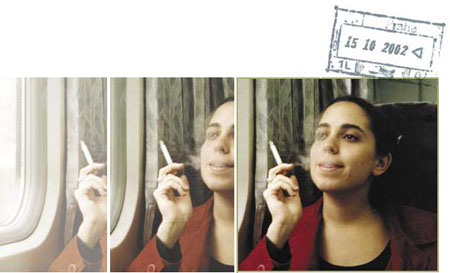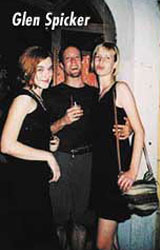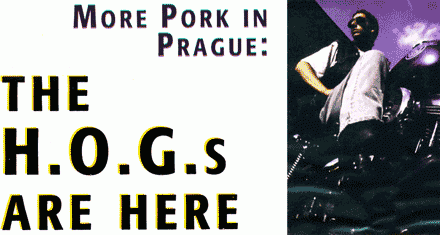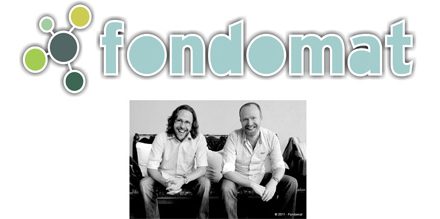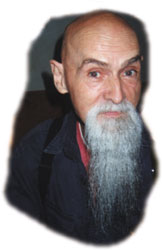THINK: What brought you to the Czech Republic?
Yeela Rosenfeld: The main reason is that the film industry in Israel is pretty much dying because of the intifada and the Palestinian condition there. So there’s quite a problem for film-makers, especially for independent film-makers, to find work and make creative films. The bulk of the budget is going to the defense office — not the cultural office — obviously, this is the priority. I just wanted to make movies and the film industry in Israel is really not the place right now.
Had you been to Prague before you moved here?
Yes, I came here for three days about a year and a half ago to see Sigur Rós, a really special Icelandic band. On the net, I had read that they were performing here; so I bought a ticket, came here, saw them and went back to Israel. I came for that specific purpose; but I definitely fell in love and here? thought, “I can live here.”
What’s it like living here now?
Well, I don’t know yet. But I can say that, for what I’m looking to do, Prague has good people I can create with. And in terms of culture, this city has it. It’s great.
Do you have any favorite places in Prague?
The thing is that I don’t eat out much because I don’t have money. I do, however know a couple of places. In Žižkov mainly, it’s a great neighborhood. I know many people who hang out there. The places I like here are away from the center — the small, cozy Czech places. This is my thing. I’m not too familiar with places in the center because they’re expensive; but I also prefer the homey Czech food.
Tell us how you began your film career. How old were you?
I am 22 now; I started when I was 14. I was in the film department in high school. After I graduated, my final film ended up in a Jerusalem film festival. I then got accepted to be the head director of the film squad in the Israeli army. I proceeded to serve as a director for two years. In those two years, I directed 13 movies for the army and then I was released.
What kind of films were you making for the army?
Everything: documentaries, dramas, music videos, image films…you know, propaganda. This I didn’t like. But we also had big productions of dramas, fiction films. Mainly for the army, but also for civilians.
Civilians? How so?
They would want to know what’s happening to soldiers at the front. So these films would be broadcast via Israeli television, to civilians. These were completely professional productions (co-productions between the film industry and the army), using the highest format of film. And during the making, I was always working with the entire film industry.
What was your schedule like back then?
It was pretty intense. I directed 13 movies in 2 years. [sighs] I barely slept those two years.
What are you working on now?
Well, I just finished my last film in Israel and I came here right after. And from here, I’m pushing this film to festivals around the world. But I’m also doing a lot of writing for my next work.
Tell us about your last film.
The film is called Spinneg; it’s a name of a place that doesn’t exist. It had run in Israel as a completely independent film — my private investment. The film was huge, with a crew of over 100 people, all volunteers. It’s about people that are stuck in loops in their life. There’s a main character trying to get to Spinneg. He’s hitch-hiking, and every driver that takes him drops him off at the same place they picked him up. So throughout the film, he can’t actually go one millimeter ahead of the place in which he stands. All the drivers are stuck in loops too. Everybody is just stuck in this circle, spinning consciously; but they can’t break their loops. Usually, I just tell people to see it. You have to feel it. Actually, I’m trying to set up a screening at Kino MAT [Karlovo namìsti]. I’m not sure when yet…soon.
And how long is the film?
25 minutes.
Do you have any tips for other up-andcoming film-makers?
One of the problems I’ve encountered is that I speak no Czech. I’m still trying to get to places that have English-speaking crews. I’m also an assistant director, but most of the places require Czech. That is really important.
And what about film-making in Prague itself?
Well, I think Prague is a great place for inspiration and writing. Maybe, coming from Israel, any other place would be quiet and peaceful. But Prague really is. I can relax. And living here isn’t that expensive, so you can actually afford sitting and writing.
How do you feel about being away from home?
Well, actually I’m worried because my family is there. All the people I love in the world are there. It’s tense. Every week there are attacks. From here, you’re more worried than when you live there. I lived in the center of Tel Aviv for four years and yes, things explode around you, but you’re living. And you’re having a great great life. You can really do what you want, and live, and it’s okay. I mean, you get paranoid every once in a while; and you can get kind of depressed once in a while because Israel is such a small country and a lot of people get killed; you know someone that knows someone, and you know someone. It’s a funeral thing. From here, I can only say that I’m not going to discuss the politics or solutions. Even if I would, it’s so complex and hopeless from the point we’re standing in.
What are your hopes for that region?
[pause] I really hope that we’d have more visionary leaders. And I really hope that it will be solved soon. But I can just hope. I’m not optimistic. To be realistic, I don’t see a solution in the next 20 years. So I just hope that everyone I know is safe.
Finally, what do you think to yourself as you walk across the Charles Bridge?
[smiles] Do you want the truth?
Yes, of course.
Well, of course you can’t ignore how beautiful it is…but it’s hard to see when it’s so commercialized. I prefer the quiet places.

